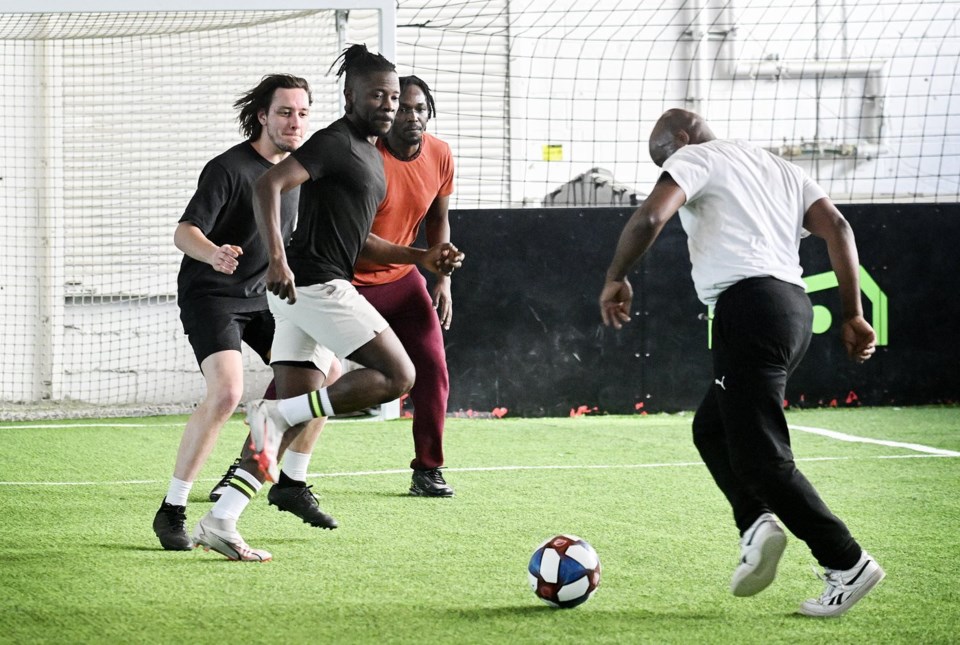MONTREAL — Fabrice Mugabe passes the ball beyond the opposition defender to Jean-Philippe Duré, who strikes it into the gloves of the goalkeeper, an intervention worker at the Montreal homeless shelter where both men are staying.
For the men on the indoor field in Montreal’s Plateau neighbourhood, it was the first chance to show off their skills to recruiters, who are fielding a team to represent Canada at an annual international soccer tournament in Oslo, Norway, in August — the Homeless World Cup.
After Wednesday’s practice session, Mugabe, 35, said he felt “tired, exhausted, winded but above all amazing because it has been a long time since I've been out."
“I'm tapping into something I haven't tapped into in a long time,” he said, relishing his shot to potentially suit up for Canada.
The Canadian Street Soccer Association, which organized Wednesday's training session, is a non-profit that uses sports to help people experiencing homelessness and other forms of social exclusion to reintegrate into society. It reached out to the city's homeless shelters, inviting the vulnerable to take part in the beautiful game.
The association's goal is to recruit players from different provinces to participate in the Homeless World Cup, run by a charity called the Homeless World Cup Foundation.
After the COVID-19 pandemic struck, Mugabe lost not only his job at a warehouse, but also the roof over his head. “I kind of went through a rough patch like everybody else, and without work I didn't really have anywhere to go,” he said. But with the help of Maison du Père, a men's homeless shelter in Montreal, Mugabe has a new job and is putting money aside so he can move into an apartment.
Bob Humphreys, Quebec program director at the Canadian Street Soccer Association, oversaw Wednesday's practice. Originally from London, England, Humphreys said his group organizes soccer matches to give homeless people the opportunity to build community and recover from hardship.
“It's about putting smiles on faces … putting an ounce of positivity back into the mindset,” he said. “It's not about the talent. It's not about the soccer. It's more about the social side and it's about these guys building social skills, reintegrating back into society.”
Humphreys said he had expected about seven players on Wednesday, but only two unhoused men turned up. The day's frigid temperatures made it difficult for participants to travel, he said, adding that a truck belonging to Old Brewery Mission, one of the other Montreal shelters involved in the program, had a flat tire and couldn't transport players.
Duré, 49, unhoused since 2021, says he showed up on Wednesday to show off his skills on the pitch. “Frankly, I feel very good,” he said after practice. “I have soccer talent and want to prove myself.”
Samuel Drolet-Bégin, intervention worker at Maison du Père, said the soccer program allows caseworkers and the unhoused people they work with to connect outside the shelter environment.
Hossam Khedr, Canadian Street Soccer Association CEO, said a total of eight players will be recruited for a mixed men and women’s team. For now, the association is recruiting in Quebec, Ontario, Alberta and British Columbia, but it plans to expand the program to Canada’s other provinces for future Homeless World Cup tournaments.
For the tournament in August, each team will field four players — one goalkeeper and three outfielders — on the pitch, which is smaller than the regular size FIFA soccer field. The tournament is hosted by a different city each year; previous editions were hosted by Paris and Rio de Janeiro.
Players must be recently unhoused or temporarily housed, Khedr explained. However, some people with fixed addresses, including refugees and those who struggle with mental health issues or addictions, may also make the cut. The selection committee will choose people it believes will most benefit from travelling to Norway and participating in the tournament.
Ed Kiwanuka-Quinlan, the street soccer association's director of operations in Ontario, said participating in soccer was a lifeline to him when he found himself homeless over a decade ago in Brampton, Ont. Unable to deal with his mother’s death and trauma from the Ugandan civil war, he became depressed and tried to take his own life.
Kiwanuka-Quinlan was in a shelter for two weeks when a member of another street soccer association asked him to kick a ball around. He initially turned the offer down, but ended up playing and feeling the “euphoria of belonging to something.”
Each successful pass and goal was a cause for celebration that gave him the hope and energy to begin getting his life back on track. After being homeless for two years, he represented Canada at the 2012 Homeless World Cup in Mexico.
“It was the simplicity of being invited … and that is the transformative power of sport … being made to feel like you matter."
This report by The Canadian Press was first published Jan. 25, 2025.
Joe Bongiorno, The Canadian Press




